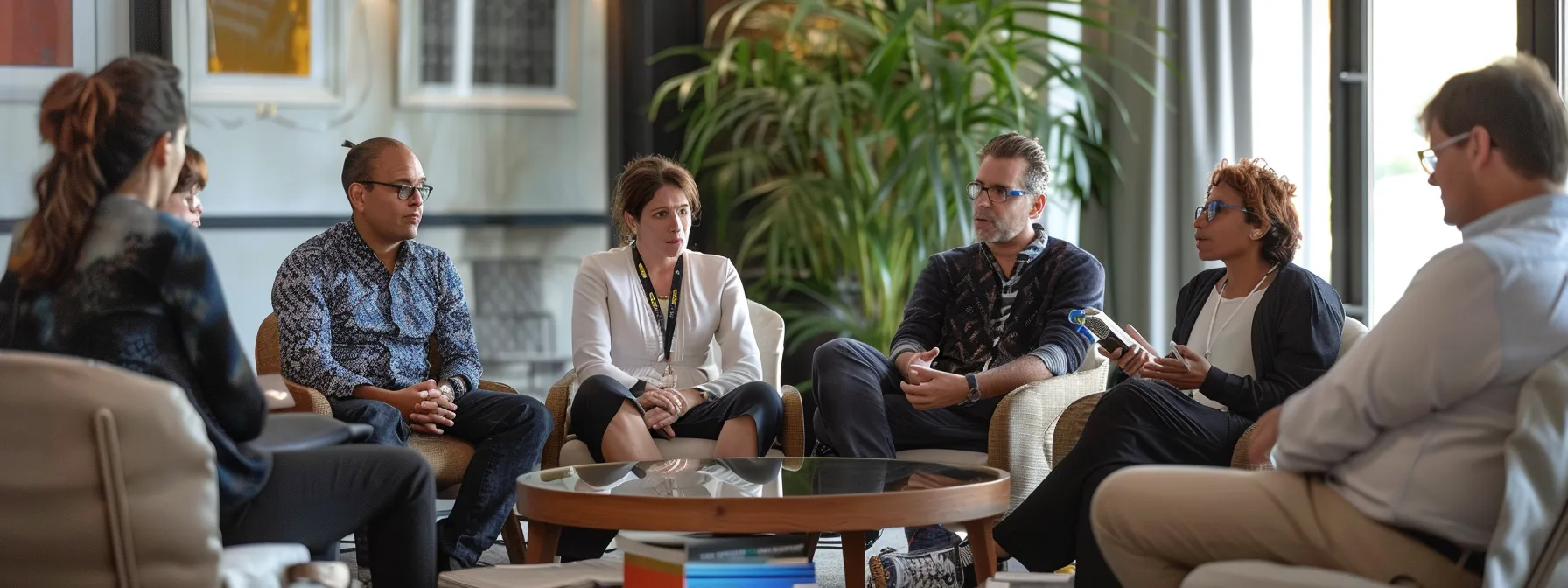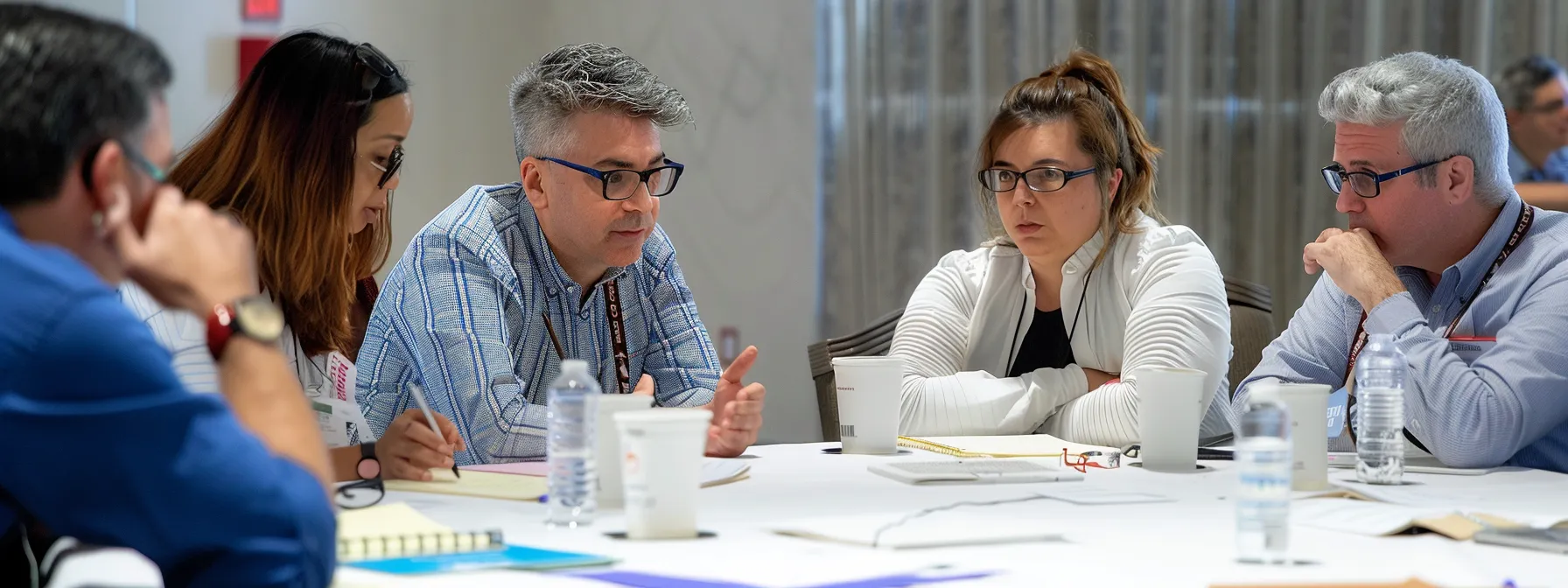Disclaimer: We sometimes use affiliate links in our content. For more information, visit our Disclaimer Page.
Have you ever found yourself struggling to navigate a difficult conversation at work? Research shows that effective negotiation techniques can significantly improve communication outcomes in such situations. In this post, you’ll learn how to prepare for tough discussions, develop your emotional intelligence, and apply proven negotiation techniques. By mastering these skills, you’ll not only enhance your observation of team interactions but also contribute positively to your organizational culture. Let’s address the challenges you face in conversations and turn them into opportunities for growth and understanding.
Key Takeaways
- Recognizing personal triggers enhances your ability to manage difficult conversations effectively
- Establishing credibility involves preparation and confident communication during contentious discussions
- Active listening fosters collaboration and helps de-escalate tension in negotiations
- Identifying shared interests creates a foundation for cooperative dialogue and better outcomes
- Reflecting on feedback is essential for improving negotiation techniques and communication skills
Understanding the Nature of Difficult Conversations

Identifying common challenges in communication, such as managing anger and ensuring credibility, is crucial in mastering difficult conversations. By recognizing personal triggers and biases, you can better navigate these interactions. Additionally, assessing the consequences of avoiding tough topics helps you understand the impact of inaction. These insights are grounded in neuroscience and equip you with practical skills for effective negotiation.
Identifying Common Challenges in Communication
When engaging in difficult conversations, you may encounter various challenges that hinder effective communication. One common issue is the emotional barrier, such as anger or frustration, which can impact your ability to express yourself clearly. Acknowledging these feelings and managing them with confidence is a skill that can greatly enhance your communication effectiveness. Additionally, understanding the cultural backgrounds of all parties involved can help bridge gaps in perception and expectation, making the conversation smoother and more productive.
Another challenge lies in establishing credibility during contentious discussions. If your audience does not perceive you as a trustworthy leader, your message may not resonate. This is where your best alternative to a negotiated agreement (BATNA) becomes essential; by preparing a strong alternative, you not only present yourself with confidence but also depict a clear path forward. Practicing these techniques provides you with the tools necessary for mastering difficult conversations, allowing you to navigate challenges with greater ease and assurance.
Recognizing Personal Triggers and Biases
Recognizing your personal triggers and biases is essential for navigating tough conversations effectively. These triggers often stem from past experiences and can provoke stress during discussions, leading to emotional responses that cloud your judgment. By developing knowledge around your own reactions, you can approach conversations with a clearer mindset, ensuring you remain calm and focused. Understanding how diversity in perspectives can influence emotions helps you prepare better for these interactions.
For instance, if you recognize that a certain tone or word triggers defensiveness in you, you can strategize on how to address it calmly. This proactive approach allows you to create an environment where all parties feel heard and valued, ultimately leading to more productive discussions and better outcomes.
Assessing the Consequences of Avoiding Tough Topics
Avoiding tough conversations can lead to unresolved issues that may escalate over time. When you choose not to engage in difficult discussions, you miss opportunities for active listening and understanding different perspectives, which can hinder effective conflict resolution. It’s essential to recognize that confronting uncomfortable topics often leads to clarity and stronger relationships, ultimately enabling you to address underlying problems before they grow.
Additionally, neglecting these conversations can create an atmosphere of tension and distrust. Your body language may indicate discomfort, signaling to others that you are not open to dialogue. By fostering curiosity and being willing to explore tough topics, you can create a more respectful and positive environment where all parties feel valued, leading to better communication and enhanced collaboration.
Difficult conversations lay the groundwork for what comes next. As you grasp their essence, you are ready to dive into the art of negotiation.
Preparing for Successful Negotiations

To prepare for successful negotiations, you need to set clear objectives for the conversation. Gathering relevant information and facts is essential to support your position and address potential conflict. Additionally, anticipating reactions and obstacles helps you navigate emotional responses, particularly those driven by the amygdala. Understanding these elements enhances your problem-solving intelligence and creates a more effective dialogue.
Setting Clear Objectives for the Conversation
To set clear objectives for your conversation, begin by identifying your motivation. Understand what you hope to achieve and outline the key points you want to discuss. This organizational step keeps your mind focused and allows you to guide the discussion toward your goals. By determining specific outcomes, you reduce fear and uncertainty, making it easier to engage in difficult conversations.
Incorporating the principles of negotiation experts like Roger Fisher can enhance your effectiveness in these discussions. Clearly defined objectives not only prepare you for objections but also strengthen your position when addressing any concerns the other party may have. This proactive approach helps foster a productive environment, ensuring that all parties understand the purpose of the conversation and are more likely to work collaboratively toward a resolution.
Gathering Relevant Information and Facts
Gathering relevant information and facts is vital for effective negotiation in difficult conversations. Understand that each person brings their own truth and biases to the table, which can shape their emotions and reactions. By collecting accurate data and understanding different perspectives, you can present a more compelling narrative that addresses their concerns while reinforcing your position.
Storytelling plays an essential role in this process, allowing you to connect with others on an emotional level. When you incorporate facts into your discussions, you build credibility and demonstrate that you have a genuine understanding of the topic at hand. This approach not only helps in clarifying your points but also fosters a more collaborative environment, making it easier to navigate potential conflicts during the conversation.
Anticipating Potential Reactions and Obstacles
Anticipating potential reactions and obstacles is a crucial aspect of preparing for successful negotiations. By understanding common emotional responses, such as frustration, you can tailor your communication approach effectively. Research from Harvard negotiation experts emphasizes the importance of empathy, allowing you to connect with the other party’s emotions, which can lead to a more constructive dialogue.
As you prepare, consider possible scenarios and reactions that may arise during the conversation. This foresight helps you develop strategies to address objections proactively, minimizing misunderstandings. For instance, if you foresee that the other party may feel defensive, you can craft your message to acknowledge their concerns, demonstrating respect for their viewpoint while steering the conversation toward a solution.
- Understand common emotional responses, such as frustration.
- Apply empathy to connect with the other party’s feelings.
- Tailor your communication approach based on anticipated reactions.
- Develop strategies to address objections proactively.
- Acknowledge concerns to help steer the conversation positively.
You can prepare well, but success hinges on how you convey your message. Next, you will learn how to sharpen your communication skills and make your words count.
Developing Effective Communication Skills

Practicing active listening techniques is essential for effective communication in difficult conversations. You’ll learn how to utilize open-ended questions to foster dialogue and encourage employees to share their thoughts freely. Additionally, expressing your ideas clearly and assertively will enhance your interactions. Insights from Sheila Heen and the Harvard Negotiation Project will guide you in developing a mindset that promotes collaboration and understanding during challenging discussions.
Practicing Active Listening Techniques
Practicing active listening techniques is crucial for effectively navigating difficult conversations, as it allows you to connect with the other party’s emotions. By focusing on their words and confirming your understanding, you reinforce personal branding as someone who values open dialogue. This instinct to listen can transform your discussions and lead to more amicable resolutions, as negotiation experts often emphasize the importance of understanding before being understood.
Engaging in active listening can also help you formulate a hypothesis about the speaker’s feelings, opening avenues for deeper communication. When you respond thoughtfully to their concerns, you demonstrate respect and create a safe space for sharing ideas. This approach not only facilitates smoother conversations but also builds trust, paving the way for collaborative outcomes in challenging negotiations.
Utilizing Open-Ended Questions to Foster Dialogue
Utilizing open-ended questions is a powerful technique for fostering dialogue during difficult conversations. By asking questions that encourage thoughtful responses, you create an opportunity for all parties to express their feelings and share their perspectives. For instance, instead of asking, “Do you agree with this approach?” you might ask, “What are your thoughts on this approach and how do you feel it impacts our productivity?” This method not only enhances your understanding of the other person’s behavior but also builds rapport and trust in the conversation.
The New York Times often emphasizes the concept of engaging in conversations that move beyond yes or no answers. This technique allows you to explore underlying issues and ensures that everyone involved feels valued and heard. By incorporating open-ended questions into your discussions, you transform potentially contentious interactions into constructive dialogues. This shift can lead to more effective negotiation outcomes, as it empowers individuals to share their insights and collaborate toward solutions that benefit everyone.
Expressing Thoughts Clearly and Assertively
Expressing your thoughts clearly and assertively is vital during difficult conversations, particularly in negotiations where interpersonal conflict may arise. By articulating your views confidently, you demonstrate respect for yourself and the other parties involved. This can help you build rapport, as clarity in your communication reduces the chance of misunderstandings, allowing everyone to focus on the issues at hand rather than getting caught up in emotions or misinterpretations.
Even with strong communication skills, emotions can complicate things. Understanding how to manage these feelings helps you stay steady when conversations heat up.
Managing Emotions During Difficult Interactions

Staying composed under pressure is essential when navigating difficult conversations. Understanding and acknowledging others’ emotions helps create a respectful environment. Additionally, implementing strategies to de-escalate tension can transform a heated exchange into a constructive dialogue. These approaches will enhance your negotiation skills and foster better communication, empowering you to tackle even the toughest discussions.
Staying Composed Under Pressure
Staying composed under pressure is essential during difficult conversations, as it allows you to maintain clarity and authority. When emotions run high, take a moment to breathe deeply and center yourself before responding. This simple technique can prevent escalations and provide you with the mental space to think clearly, enabling you to address the issues at hand with confidence and purpose.
By recognizing your own emotional triggers, you can prepare to handle tense situations more effectively. For instance, if you know that certain comments invoke a strong reaction, practice reframing your thoughts before entering the discussion. This proactive strategy helps you remain calm and focused, ensuring that the conversation remains productive and solutions-oriented, rather than devolving into conflict.
Understanding and Acknowledging Others’ Emotions
Understanding and acknowledging others’ emotions is vital in difficult conversations, as these emotions often dictate how the interaction unfolds. By paying attention to verbal and non-verbal cues, you can recognize feelings of frustration, anger, or insecurity in your conversation partner. This awareness allows you to respond compassionately, which can help to defuse tension and promote a more open dialogue.
When you validate others’ emotions during negotiations, you demonstrate that you respect their perspective, fostering trust and collaboration. For example, if a colleague expresses worry about deadlines, acknowledge their feelings by saying, “I can see this situation is stressing you out.” This simple acknowledgment not only eases the immediate emotional response but also sets the stage for a constructive conversation focused on finding a solution. Engaging in discussions with empathy can significantly enhance the effectiveness of your negotiation techniques.
Implementing Strategies to De-Escalate Tension
To effectively de-escalate tension during difficult conversations, you can use techniques such as active listening and validation. When you actively listen, you demonstrate that you are genuinely interested in the other person’s viewpoint. This engagement encourages them to share their thoughts openly, reducing defensive feelings and setting the stage for a more productive dialogue.
Another key strategy is to remain calm and composed while addressing any frustrations. Use a steady tone and controlled body language to signal that you are open to resolving the issue. By acknowledging the other person’s emotions and responding with empathy, you create an atmosphere of respect and cooperation, which can greatly enhance the chances of reaching a mutually beneficial outcome:
- Practice active listening to understand their perspective.
- Validate their feelings to create a respectful environment.
- Maintain a calm demeanor to encourage open dialogue.
- Use empathetic responses to foster cooperation.
Emotions can cloud your judgment, but clarity cuts through the noise. With the right techniques, you can turn tension into progress in any negotiation.
Applying Proven Negotiation Techniques

Finding common ground and shared interests is essential for effective negotiation during difficult conversations. Employing problem-solving strategies allows you to address conflicts constructively. By focusing on reaching agreements that benefit all parties, you set the stage for collaboration and positive outcomes. Each of these approaches plays a vital role in helping you navigate challenging discussions with confidence and clarity.
Finding common ground and shared interests is crucial when engaging in difficult conversations. By identifying overlapping goals, you create a foundation for collaboration that helps all parties feel invested in the outcome. For instance, if you’re negotiating a project timeline with a colleague, acknowledging both your need for timely results and their desire for thoroughness can foster a cooperative environment and pave the way for a mutually beneficial solution.
When you focus on shared interests, you shift the conversation from competing positions to a constructive dialogue. This approach reduces defensiveness and opens avenues for creative problem-solving. By actively listening and asking questions that explore underlying needs, you encourage a partnership that helps everyone work towards common objectives, ultimately leading to successful negotiation outcomes.
Employing Problem-Solving Strategies
Employing problem-solving strategies during difficult conversations allows you to shift the focus from conflict to collaboration. When you approach discussions with a clear intention to find solutions, you invite others to participate in the process, fostering a sense of teamwork. For instance, if there’s a disagreement about project responsibilities, engaging your colleagues in brainstorming can lead to creative solutions that satisfy everyone’s concerns.
Moreover, by utilizing a problem-solving mindset, you can address emotions that often complicate discussions. When tensions arise, guiding the conversation toward shared goals and interests helps to diffuse potential conflict. This approach not only enhances the effectiveness of your negotiation techniques but also builds stronger relationships, making future interactions more positive and productive.
Reaching Agreements That Benefit All Parties
Reaching agreements that benefit all parties is essential in mastering difficult conversations. By understanding the interests and needs of each participant, you can facilitate negotiations that create win-win outcomes. This approach not only resolves the immediate issues but also strengthens relationships, providing a positive foundation for future discussions.
To achieve such agreements, actively listen and engage each party in the negotiation process. Encourage collaboration by inviting suggestions and ideas; this fosters a sense of ownership over the resolution. Utilizing these negotiation techniques empowers everyone involved, ensuring that agreements reached are satisfying and sustainable:
Every conversation teaches you something, whether you win or lose. Take a moment to reflect on what happened; it will guide your future talks.
Reflecting and Learning From Each Conversation

Evaluating the outcome and process of each conversation is essential for mastering difficult discussions. Identify areas for personal growth by reflecting on your performance and interactions. Implementing feedback effectively will help you improve future negotiations. These steps will empower you to enhance your skills and navigate challenging conversations with greater confidence and success.
Evaluating the Outcome and Process
Evaluating the outcome and process of each difficult conversation is crucial for your growth in negotiation skills. Take the time to reflect on what worked well and what did not, considering both your actions and the responses of the other party. This introspection helps you identify patterns in communication that may hinder or enhance your effectiveness, allowing you to adapt your strategies in future discussions.
As you analyze the process, focus on specific techniques that contributed to a successful or unsuccessful outcome. For example, if employing active listening techniques led to improved understanding, make a note to incorporate that more frequently. By recognizing these key elements, you position yourself to enhance your approach, ultimately fostering more productive and respectful exchanges in your negotiations.
Identifying Areas for Personal Growth
Identifying areas for personal growth is essential for mastering difficult conversations and improving your negotiation skills. After each conversation, take the time to reflect on your responses and interactions. Consider whether you effectively managed your emotions or if certain triggers affected your ability to communicate clearly. This self-assessment will help you pinpoint specific aspects that require improvement, enabling you to enhance your approach in future discussions.
In addition, recognizing your strengths and weaknesses in negotiation techniques can empower you to develop a more effective communication style. For instance, if you find you struggle with active listening during stressful conversations, you might focus on practicing this technique in less challenging situations. By consistently evaluating and adjusting your strategies, you’ll foster confidence and proficiency, ultimately leading to better outcomes in your difficult conversations.
Implementing Feedback for Future Improvement
Implementing feedback from your difficult conversations is vital for your growth and effectiveness in negotiations. After each discussion, take the time to review the input you receive from peers or mentors regarding your communication style and emotional responses. By integrating this feedback into your preparation for future conversations, you can refine your approach and better manage challenging interactions.
Utilizing feedback allows you to identify specific areas where you can improve, such as enhancing your listening skills or becoming more assertive in expressing your views. For example, if a colleague notes that you tend to interrupt during discussions, make a conscious effort to pause and ensure others feel heard. This practice not only fosters a more respectful dialogue but also strengthens your negotiation skills for future conversations.
Conclusion
Mastering difficult conversations through effective negotiation techniques is essential for fostering clear communication and building strong relationships. By acknowledging personal triggers, setting clear objectives, and practicing active listening, you can navigate challenging discussions with confidence. Emphasizing shared interests and problem-solving strategies helps to create win-win outcomes that benefit all parties involved. Developing these skills not only enhances your negotiation capabilities but also promotes a respectful and collaborative environment essential for successful interactions.





